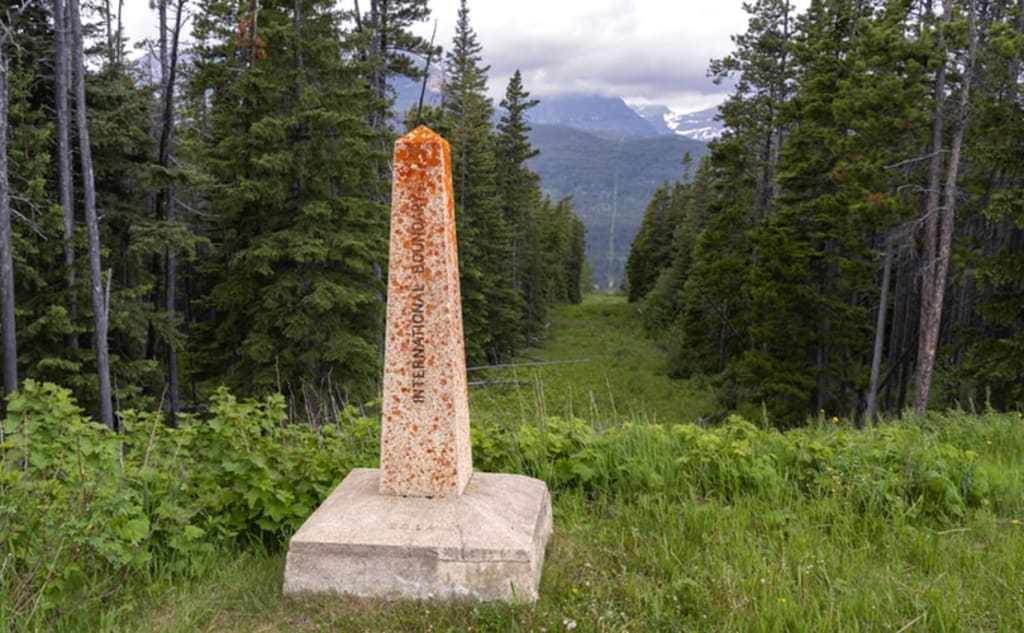An Abdication of Responsibility
When it comes to minding the US-Canada border, whose responsibility is it?

The curious case of the Peace Arch Park recently came to national prominence as a result of the prosecution of Michael Kong and his son, Matthew. Kong Senior and Junior are accused of facilitating the illegal entry of numerous foreign nationals over a number of years, through the park into Canada. I know all about this case, and not just vicariously. I’ve been directly involved in it, and many other cases like it.
The Peace Arch Park is a quaint remnant of an earlier time. Situated on the US-Canada frontier south of Vancouver and north of Seattle, it’s a wide-open monument to two hundred plus years of peace between two behemoths. It’s also a glaring national security threat to both countries.
I spent seventeen years policing the border, and most of this time policing this park. It’s not an easy job, let me tell you.
If you’ve ever visited this park, and you’re of a law enforcement mindset, your first words will likely be similar to those of some friends of mine, CBSA officers from Ontario. “How the hell do you control this?” My colleagues were used to bridges and tunnels. If you wanted to cross between ports at Niagara, a barrel was required. The short answer to my colleagues’ question was: “You don’t control it.” Tourists come and go, snapping photos. Weddings are hosted. People show up, with no ID, blithely unaware that they are at an international border. There is a cost to all this openness, of course. One cost is the movement of individuals into Canada, who, by avoiding the Port of Entry, make “Inland” refugee claims, thereby ensuring they can remain in Canada, likely for years, while their cases are heard. But there is another, more dangerous effect of the open gates of the Peace Arch.
On January 28, 2019, a Surrey RCMP Constable and former CBSA Officer named Attila Szalay noted a broadcast about a stolen vehicle linked to a Washington State homicide, which had been abandoned just south of the Peace Arch. Cst Szalay backtracked to the Peace Arch Hospital in White Rock, and arrested the suspect after a pursuit through the hospital. A firearm was recovered. The suspect had walked through the open gates into Canada.
The above situation, though a dramatic example, is by no means an isolated occurrence. Any CBSA officer who has worked this area long enough can tell their own stories of close encounters with the very dangerous. I recall stopping a rough-looking backpacker in the Park one afternoon, and while perusing his California ID, asking him casually, “What have you been arrested for?” When the answer was “Attempted murder of a police officer” the handcuffs came out. I also recall backing up two colleagues in a knock-down, drag-out fight with a seven-time deportee and subject of interest in two homicides in Vancouver…in front of one of those lovely wedding receptions. On many other occasions, casual inquiries into what people were doing strolling about the park, turned into foot chases and fist fights. It happens. A lot.
The Park is wide open, like many other parts of our frontier. And the people strolling through it are not only economic migrants or kids smuggling beer, but killers, rapists, and terrorists.
So, we’re doing something about this, right? Er, not exactly. Douglas Quan of the National Post, who did an excellent report on the Kong case, got two wildly different answers when he asked the CBSA and the RCMP “Who is responsible for patrolling the park?”
The CBSA said it was the RCMP. The RCMP said it was both agencies. In fact, the CBSA spokesperson downright disavowed jurisdiction, saying “The Peace Arch Park is located outside the agency’s mandate.” That’s a little misleading. CBSA has the legal authority under both Customs and Immigration law to patrol between the ports. If the spokesperson was correct, then why was Kong being arrested by Port-of-Entry officers and surveilled by CBSA Investigators?
CBSA can exert authority between the ports. They just don’t want to. Hence, they cede responsibility to the RCMP in a Memorandum of Understanding, in which RCMP will undertake “Border Patrol” duties.
The problem is that this “Border Patrol” is minimally staffed and provides coverage only at certain times. Most of the work of responding to border breaches falls on Surrey Detachment members, already terribly overstretched, or CBSA officers, who are threatened with discipline for leaving the confines of their port. And if they need to work as a team, their radios still are not interoperable. Despite this regime of threats and encouragement to look the other way, CBSA officers still do the lion’s share of policing the Park. The Agency seems happy to let them, as long as nothing controversial happens. But all the sensors that detect unlawful intrusion are American, as are most of the dedicated Border Patrollers.
In short, this means that the Park is only patrolled by default, either by people too busy doing other things, or under threat for doing what really should be one of their main priorities. Hence the jurisdictional ping-pong, and the ease with which people can and do stroll though.
If you’re okay with armed murder suspects making it into crowded emergency rooms, carry on. If you think they ought to be stopped a little further south, then it’s time to call out both the CBSA and the RCMP for their abdication of responsibility. It’s time to insist on a fully staffed and resourced, 24/7, Canadian Border Patrol.
About the Creator
Grant Patterson
Grant is a retired law enforcement officer and native of Vancouver, BC. He has also lived in Brazil. He has written fifteen books.






Comments
There are no comments for this story
Be the first to respond and start the conversation.